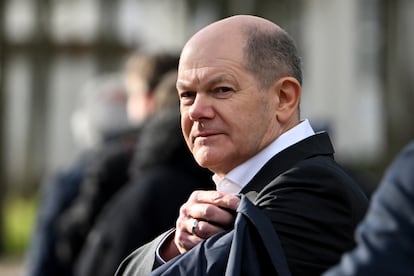Scholz says labor and climate challenges loom for Germany
Shifting away from planet-heating fossil fuels toward renewable power will be particularly difficult for Germany’s energy-intensive manufacturing industry

German Chancellor Olaf Scholz said Monday that his country faces considerable challenges, but also opportunities, in the coming years as it seeks to transform toward a green economy with a shrinking workforce.
The 64-year-old said it will be necessary to tap into reserves in the labor market and attract skilled migrants if Germany is to achieve its goal of becoming ‘climate neutral’ by 2045.
“There’s a lot to do for which we need very many women and men who work here, but also those who come from other countries, so that all the work that needs to be done in Germany gets done,” he told reporters at the end of a two-day government retreat outside Berlin.
Scholz, a member of the center-left Social Democratic Party, said that due to demand for workers “Germany will leave the problem of joblessness behind in the coming years.”
Shifting away from planet-heating fossil fuels toward renewable power will be particularly difficult for Germany’s energy-intensive manufacturing industry.
“Until 2030 we need to erect four to five new wind turbines every day and the equivalent of more than 40 soccer pitches of solar panels,” said Scholz.
Germany’s Economy Ministry warned that failure to reduce emissions and curb climate change could cost the country dearly.
A report commissioned by the government and published Monday estimated that Germany has already suffered economic damage of at least 145 billion euros ($155 billion) between 2000 and 2021, more than half of that since 2018 alone.
“By the middle of the century researchers calculate that the extent of planetary warming will cause cumulative damage to the national economy of between 280 billion to 900 billion euros” due to heatwaves, floods, health impacts, ecosystem and biodiversity loss, the ministry said.
Vice Chancellor Robert Habeck said the investments required for the transformation of the economy should be seen as an opportunity for growth.
“This is a gigantic industry and jobs program,” he said.
Sign up for our weekly newsletter to get more English-language news coverage from EL PAÍS USA Edition
Tu suscripción se está usando en otro dispositivo
¿Quieres añadir otro usuario a tu suscripción?
Si continúas leyendo en este dispositivo, no se podrá leer en el otro.
FlechaTu suscripción se está usando en otro dispositivo y solo puedes acceder a EL PAÍS desde un dispositivo a la vez.
Si quieres compartir tu cuenta, cambia tu suscripción a la modalidad Premium, así podrás añadir otro usuario. Cada uno accederá con su propia cuenta de email, lo que os permitirá personalizar vuestra experiencia en EL PAÍS.
¿Tienes una suscripción de empresa? Accede aquí para contratar más cuentas.
En el caso de no saber quién está usando tu cuenta, te recomendamos cambiar tu contraseña aquí.
Si decides continuar compartiendo tu cuenta, este mensaje se mostrará en tu dispositivo y en el de la otra persona que está usando tu cuenta de forma indefinida, afectando a tu experiencia de lectura. Puedes consultar aquí los términos y condiciones de la suscripción digital.








































